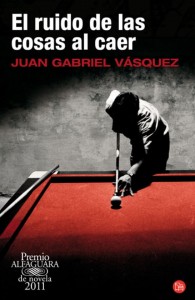Blog del Instituto Cervantes de Dublín
Torre Martello
Club de lectura: Días sin ti – Elvira Sastre
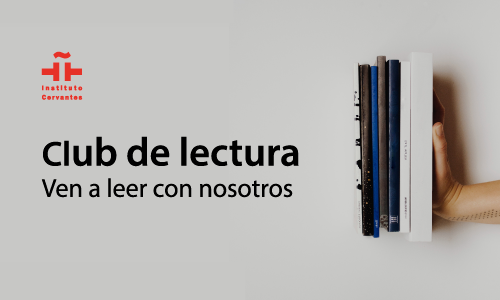
El pasado 15 de febrero, el club de lectura del Instituto Cervantes de Dublín se reunió por Zoom para charlar sobre la novela ‘Días sin ti’ de Elvira Sastre. En este libro nos adentramos en la historia de Dora, una maestra durante la Segunda República, y su nieto Gael, un hombre joven que nos cuenta su historia de amor con Marta.
(Siga leyendo esta entrada…)
Club de lectura en español / Spanish Language Book Club
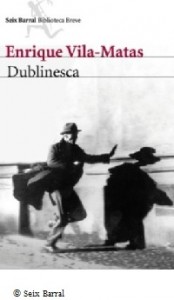
Fecha: Jueves, 14 de enero
Hora: 18:30 pm
Lugar: Instituto Cervantes Dublín, Lincoln House – Lincoln Place, Dublín 2
Desde la Biblioteca Dámaso Alonso os invitamos a dialogar sobre literatura en español en un entorno distendido. Nos reuniremos una vez al mes para debatir sobre una lectura previamente acordada.
Si te interesa la literatura en español y buscas la oportunidad de practicar el idioma, ¡no dudes en ponerte en contacto con nosotros!
La próxima reunión tendrá lugar el día 14 de enero a las 18:30 horas, y la obra seleccionada es Dublinesca, del escritor español Enrique Vila-Matas.
Si deseas unirte a nosotros, o incluso colaborar en la gestión del club, envíanos un mensaje a: bibdub@cervantes.es.
Estad atentos a nuestro Facebook, donde publicaremos más información en breve.
Date: Thursday, January 14th
When: 6:30 pm
Where: Instituto Cervantes Dublín, Lincoln House – Lincoln Place, Dublin
We are very excited about a project we are preparing at the Dámaso Alonso Library: a club that allows you to discuss your favourite books in Spanish in a friendly and relaxed atmosphere. We will meet once a month to talk about a book previously chosen by the club.
Let us know if you are interested in Literature written in Spanish and wish to talk about your preferred authors in the Spanish language.
Our next meeting will take place on Thursday, January 14th at 6:30 pm. The chosen novel is Dublinesca, by Spanish autor Enrique Vila-Matas.
If you wish to join is or even collaborate on running the club, just email us at bibdub@cervantes.es
Keep an eye on our Facebook, for updates.
Club de lectura en español / Spanish Language Book Club
Fecha: Jueves, 3 de diciembre de 2015
Hora: 18:30 pm
Lugar: Instituto Cervantes Dublín, Lincoln House – Lincoln Place, Dublín 2
El otoño ha llegado y reconforta disfrutar de una buena lectura.
Desde la Biblioteca Dámaso Alonso queremos invitaros a participar en un nuevo proyecto: un club que ofrece la posibilidad de dialogar sobre literatura en español en un entorno distendido. Nos reuniremos una vez al mes para debatir sobre una obra previamente acordada.
Si te interesa la literatura en español y buscas la oportunidad de practicar el idioma, ¡no dudes en ponerte en contacto con nosotros!
La primera reunión tendrá lugar el jueves 3 de diciembre a las 18:30 horas, y la obra seleccionada es El ruido de las cosas al caer, del escritor colombiano Juan Gabriel Vásquez.
Si deseas participar en el club de lectura o incluso colaborar en su gestión, envíanos un mensaje a bibdub@cervantes.es
Estad atentos a nuestro Facebook, donde publicaremos más información en breve.
Texto: María Toribio
Versión en inglés: Enca González Cambil
International IMPAC Dublin Literary Award 2014
Date: Thursday, December 3rd
When: 6:30 pm
Where: Instituto Cervantes Dublín, Lincoln House – Lincoln Place, Dublín
The Autumn season is upon us. It is time to curl up with a good book and a piping hot cup of tea.
We are very excited about a project we are preparing at the Dámaso Alonso Library: a club that allows you to discuss your favourite books in Spanish in a friendly and relaxed atmosphere. We will meet once a month to talk about a book previously chosen by the club.
Let us know if you are interested in Literature written in Spanish and wish to talk about your preferred authors in the Spanish language.
Our First meeting will take place on Thursday, December 3rd at 6:30 pm. The chosen novel is The sound of things falling, the third novel by Colombian author Juan Gabriel Vásquez.
If you wish to join is or even collaborate on running the club, just email us at bibdub@cervantes.es
Keep an eye on our Facebook page for updates!
English version: Enca González Cambil
Club virtual de lectura / Virtual Reading Club
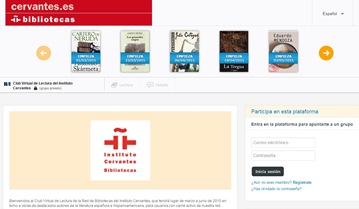 La Biblioteca del Instituto Cervantes de Dublín te invita a participar en el Club virtual de lectura, un espacio en la web donde, mediante una plataforma de lectura social, podrás compartir opiniones y debatir sobre obras destacadas de la literatura española e hispanoamericana con otros usuarios de bibliotecas del Instituto Cervantes de todo el mundo. Los títulos están disponibles en nuestra biblioteca electrónica y las fechas de debate son las siguientes:
La Biblioteca del Instituto Cervantes de Dublín te invita a participar en el Club virtual de lectura, un espacio en la web donde, mediante una plataforma de lectura social, podrás compartir opiniones y debatir sobre obras destacadas de la literatura española e hispanoamericana con otros usuarios de bibliotecas del Instituto Cervantes de todo el mundo. Los títulos están disponibles en nuestra biblioteca electrónica y las fechas de debate son las siguientes:
- 2-13 de marzo de 2105: –El cartero de Neruda / Antonio Skármeta
- 16-27 de marzo de 2015: –Los girasoles ciegos / Alberto Méndez
- 7-17 de abril de 2015: –El perseguidor / Julio Cortázar
- 20-30 de abril de 2015: –La tregua / Mario Benedetti
- 4-15 de mayo de 2015: –El misterio de la cripta embrujada / Eduardo Mendoza
- 18-29 de mayo de 2015: –Los jefes / Mario Vargas Llosa
Para formar parte del Club virtual de lectura es imprescindible:
- Tener vigente el carné de socio de biblioteca del Instituto Cervantes.
- Dominio de la expresión escrita del español.
Si cumples estas condiciones y deseas participar, consulta la normativa y regístrate en la plataforma de lectura.
Si tienes cualquier problema, por favor, diríjete a: club.virtual.lectura@cervantes.es.
Instituto Cervantes Library in Dublin invites you to participate in the Virtual Reading Club. This is a web based social reading platform that will enable you to share views and discuss renowned Spanish and South-American literary works with other Instituto Cervantes´users worldwide. You can find the titles in our Electronic library (information in Spanish). Debate dates are:
- 2nd to 13th March 2105: –El cartero de Neruda / Antonio Skármeta
- 16th to 27th March 2015: –Los girasoles ciegos / Alberto Méndez
- 7th to-17th April 2015: –El perseguidor / Julio Cortázar
- 20th-30th April 2015: –La tregua / Mario Benedetti
- 4th-15th May 2015: –El misterio de la cripta embrujada / Eduardo Mendoza
- 18th-29th May 2015: –Los jefes / Mario Vargas Llosa
To join the Virtual Reading Club please make sure that:
- You have a valid Instituto Cervantes Library card.
- You are proficient in written Spanish.
If you fulfil both conditions and you wish to join the reading club, we invite you to read the regulations (information in Spanish) and register from the 3rd to the 15th of February 2015:
Please address your queries to: club.virtual.lectura@cervantes.es.
El llano de llamas: La realidad de la vida campesina en el México posrevolucionario.
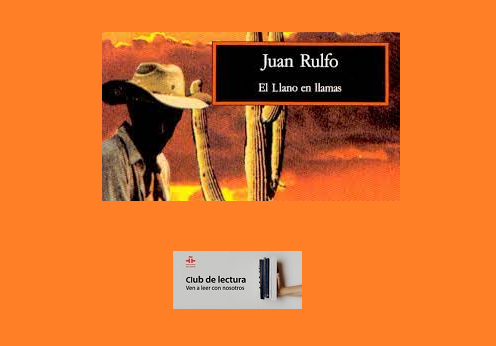
En su conocida colección de cuentos, El llano en llamas (1955), Juan Rulfo proporciona al lector una perspectiva verdaderamente profunda sobre la realidad de la vida de los campesinos mexicanos durante los primeros treinta años después de la Revolución, llamando la atención sobre los fracasos de este movimiento social contra la dictadura del presidente Porfirio Díaz que tenía como objetivo iniciar reformas sociales y mejorar la calidad de vida de esta misma población campesina. A lo largo de la colección de relatos, el autor aprovecha algunas de sus técnicas literarias más reconocibles, tales como el uso del narrador en primera persona y la descripción pormenorizada del paisaje rural para construir una imagen fiel de la experiencia de vivir en el campo mexicano y cómo se sentían los campesinos ante los desafíos socio-económicos que caracterizaban su situación: la pobreza, la pérdida de cosechas y el dilema al que tenían que enfrentarse siempre entre abandonar el campo o quedarse allí con la intención de hacer todo lo posible para superar sus dificultades. En casi todos los cuentos de esta colección, Rulfo demuestra lo difícil que era escaparse del estado de desamparo en el que se encontraban millones de mexicanos y cómo el gobierno no hacía lo suficiente para paliar los efectos de la miseria y ayudar a los campesinos a procurarse un mejor futuro.
(Siga leyendo esta entrada…)
‘El tren de los niños’: La historia olvidada de la posguerra italiana | The forgotten story of the Italian postwar
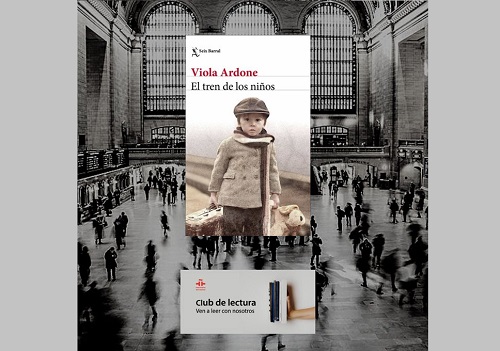
“El tren de los niños” fue una de las sensaciones editoriales más inesperadas del año 2019 en el panomara editorial italiano. Se trata de un conmovedor relato en torno al traslado al norte de Italia de miles de niños debido a la pobreza y la miseria que marcó la vida en ciudades como Nápoles tras la Segunda Guerra Mundial. Aunque la historia de la posguerra alemana es bien conocida, esta novela arroja luz sobre la situación vivida por la generación de niños de la posguerra italiana y el dilema al que se enfrentaron sus padres: mantenerles en sus barrios empobrecidos o enviarles a otra parte del país para ofrecerles una mejor oportunidad. La novela de Viola Ardone abre una ventana hacia una época oscura del pasado italiano a través de la historia de la separación forzosa de un niño (Amerigo Speranza), de su familiay de su incapacidad para entender esta situación.
(Siga leyendo esta entrada…)
El poder de una decisión: Mañana en la batalla, piensa en mí
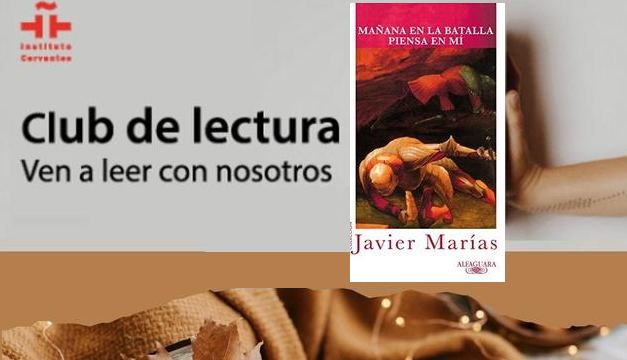
Tras haber cautivado a sus lectores a lo largo de los últimos treinta años con relatos psicológicos en torno a los aspectos más fundamentales de la condición humana, como la búsqueda del amor y la necesidad de forjar una identidad fija, Javier Marías nos proporciona con Mañana en la batalla, piensa en mí, una perspectiva sobre nuestro lado oscuro, concretamente sobre nuestra tendencia a defender por encima de todo nuestros propios intereses. En esta novela, el autor indaga sobre la repercusión de las decisiones que tomamos para cambiar el rumbo de nuestra vida y sobre la imposibilidad de poder anticipar las consecuencias que pueden generar. De esta manera, Marías quiere concienciar a los lectores sobre el hecho de que nunca tendremos certeza sobre nuestro futuro y que todos debemos enfrentarnos a las consecuencias imprevistas de ciertas elecciones a lo largo de nuestras vidas.
(Siga leyendo esta entrada…)
Doña Perfecta: El conflicto de valores sociales a finales del siglo XIX | Doña Perfecta: A conflict of social values in late nineteenth century Spain
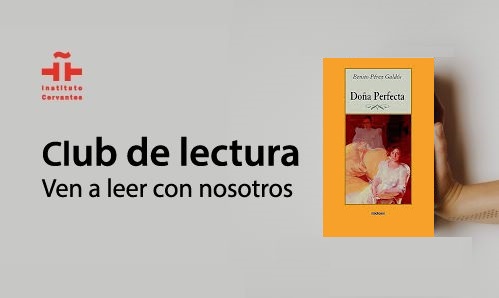
En su novela Doña Perfecta, ambientada en la España de finales del siglo XIX, Galdós dirige nuestra atención al conflicto de valores entre las fuerzas conservadoras y liberales que caracterizó a esta época de verdadera transformación social. A lo largo de esta novela somos testigos de las estratagemas de Doña Perfecta y el clérigo, Don Inocencio, para poner fin a la relación amorosa entre Rosario y Pepe Rey, ya que ambos se oponen a las actitudes liberales que promueve este último.
(Siga leyendo esta entrada…)
El poeta chileno: Los chilenos, la búsqueda, y el poder de la literatura
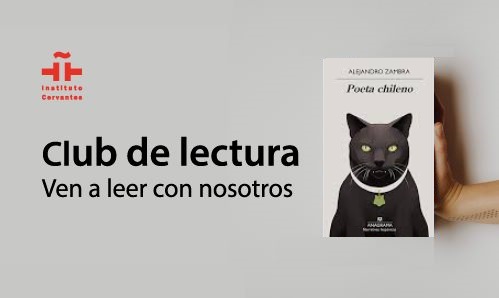
En su última novela, Poeta chileno, Alejando Zambra se centra principalmente en el tema del amor paterno y el deseo de los padres de relacionarse y construir vínculos con sus hijos. Aunque los temas de la paternidad y la cambiante estructura de la familia contemporánea han atraído mayoritariamente la atención de los críticos, la novela aborda la percepción de la literatura dentro de la sociedad y su capacidad de sacarnos del mundo que nos rodea. A medida que avanza la novela, conocemos los sueños de Gonzalo sobre ser poeta y su deseo de crear un fuerte lazo con su hijastro a través de su compartida pasión por la poesía.
(Siga leyendo esta entrada…)
Premios Príncipe de Asturias 2013 / Prince of Asturias Awards 2013
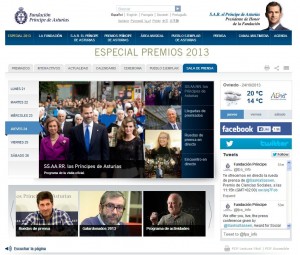 Esta semana es la semana de los Premios Príncipe de Asturias. El pasado martes, los premiados este año 2013 comenzaron a llegar a Oviedo para participar en diversas conferencias, charlas o clubs de lectura organizados con motivo de la ceremonia de entrega de los premios que se celebrará mañana viernes, a las 18:30 de la tarde, hora española.
Esta semana es la semana de los Premios Príncipe de Asturias. El pasado martes, los premiados este año 2013 comenzaron a llegar a Oviedo para participar en diversas conferencias, charlas o clubs de lectura organizados con motivo de la ceremonia de entrega de los premios que se celebrará mañana viernes, a las 18:30 de la tarde, hora española.
Los galardonados este año son Michael Haneke, Premio Príncipe de Asturias de las Artes, Saskia Sassen, Premio Príncipe de Asturias de Ciencias Sociales, Annie Leibovitz, Premio Príncipe de Asturias de Comunicación y Humanidades, la Organización Nacional de Ciegos Españoles (ONCE), Premio Príncipe de Asturias de la Concordia, Sociedad Max Planck para el Avance de la Ciencia, Premio Príncipe de Asturias de Cooperación Internacional, José María Olazábal, Premio Príncipe de Asturias de los Deportes, Peter Higgs, François Englert y el CERN, Premio Príncipe de Asturias de Investigación Científica y Técnica, y Antonio Muñoz Molina, que fuera director del Instituto Cervantes de Nueva York, premio Príncipe de Asturias de las Letras. Toda la información acerca de sus trayectorias vitales y profesionales está disponible en la página de la Fundación Príncipe de Asturias.
Las ruedas de prensa previas, los encuentros con los premiados, y la propia ceremonia de entrega de premios, presidida, cómo no, por el Príncipe de Asturias, se pueden seguir igualmente, en directo, a través de la página de la fundación.
This is the week of the Prince of Asturias Awards. On Tuesday , the laureates in 2013 arrived in Oviedo to participate in various meetings, lectures or reading clubs organized on the occasion of the award ceremony to be held tomorrow, Friday , at 6:30pm Spanish time .
This year’s laureates are Michael Haneke, Prince of Asturias Award for the Arts, Saskia Sassen, Prince of Asturias Award for Social Sciences, Annie Leibovitz, Prince of Asturias Award for Communication and Humanities, the Spanish Organization for the Blind (ONCE ), Prince of Asturias Award for Concord, Max Planck Society for the Advancement of Science, Prince of Asturias Award for International Cooperation, José María Olazábal, Prince of Asturias Award for Sports, Peter Higgs, François Englert and CERN, Prince of Asturias Award for Technical and Scientific Research , and Antonio Muñoz Molina, former director of the Instituto Cervantes in New York , Prince of Asturias award for Literature. All the information about them is available on the website of the Prince of Asturias Foundation.
On the website of the Prince of Asturias Foundation you can follow all the press conferences and meetings with the laureates, as well as the awards ceremony, presided by the Prince of Asturias.
[Video] Kevin Barry en el Festival Isla de Literatura / Isla Literary Festival
Kevin Barry participó en una lectura literaria junto a Elia Barceló, Christopher Michael Domínguez, María Negroni y Keith Ridgway. Entrevistado por Sergio Angulo. Edición de video: Cris Méndez.
Kevin Barry nació en Limerick y vive en Sligo. Su primer libro de relatos, There are Little Kingdoms, ganó el Premio Rooney de Literatura Irlandesa en 2007. Ha escrito sobre viajes y literatura para The Guardian, The Irish Times, The Sydney Morning Herald y muchas otras publicaciones. Su primera novela, City of Bohane (2011) ha sido galardonada en Reino Unido con el Authors’ club Best First Novel Award, que premia a la mejor primera novela del año.
Kevin Barry was born in Limerick and now lives in Sligo. His first collection of short stories, There Are Little Kingdoms, won the Rooney Prize for Irish Literature in 2007. He has written about travel and literature for The Guardian, The Irish Times, The Sydney Morning Herald and many other publications. His debut novel City of Bohane (2011) recently won the Authors’ Club Best First Novel award in Britain.
Leer y compartir: los libros en las redes sociales / Reading and sharing: books in social networks
Los ratones de biblioteca ya no estamos solos: si te gusta leer ha llegado el momento de que lo grites con orgullo a los cuatro vientos. Internet pone a tu alcance las herramientas necesarias para ello, ya que actualmente disponemos de un buen número de redes sociales de lectura. Éstas plataformas permiten a los usuarios compartir sus preferencias: reseñar, valorar, listar, recomendar e incluso intercambiar libros son solo algunas de las funciones que nos ofrecen.
Desde la biblioteca os proponemos y recomendamos algunas de ellas, tanto en inglés como en español:
aNobbi es sin duda una de las redes sociales de lectura más completas. Funcionando desde 2006, no ha dejado de actualizarse desde entonces y hoy día nos permite crear nuestra biblioteca (registrando qué libros tenemos, cuáles leemos o cuáles nos gustaría tener), encontrar libros y usuarios afines a nuestros gustos, crear grupos de lectura, compartir nuestras opiniones y publicar todo ello automáticamente en twitter, facebook o en nuestro blog en forma de widget. Además cuenta con aplicaciones para iPhone y Android. Hemos puesto a prueba a una de nuestras novedades, Distorsiones, del autor del mes David Roas, para que veáis como funciona: perfil en aNobii.
Libros.com (interfaz en español)
Desde esta plataforma de origen vallisoletano podrás organizar tus libros en una biblioteca virtual, buscar novedades, leer recomendaciones, compartir reseñas y valoraciones, intercambiar opiniones en el foro o leer las últimas noticias literarias en su blog, ponerte en contacto con otros lectores de la comunidad y encontrar afinidades o crear un widget para compartir todo ello en tu blog. Pero además Libros.com ofrece dos particularidades que la hacen especial: por un lado, permite comprar directamente los libros, ya que muchas editoriales han establecido convenios con ella; y por otro lado, la red social está desarrollando un proyecto de libros solidarios, en el cual los usuarios enviarían libros para repartir entre las comunidades más necesitadas. Aquí hemos comprobado la popularidad de una reciente novedad en la literatura española: El puente de los asesinos, de Pérez-Reverte.
Aunque aquí hemos propuesto dos plataformas, el universo de los lectores y libros 2.0 no se limita a éstas. A continuación hemos seleccionado una lista de redes sociales de recomendaciones literarias para que puedas escoger la que más se adapte a ti:
Interfaz en inglés
– Spinebreakers: red social para público adolescente.
– Readmill: es un sistema novedoso, que pretende no solo actuar como red social sino también como biblioteca virtual y plataforma de compra, centrado en libros electrónicos.
– Goodreads: con características similares a aNobii pero incluyendo un espacio para la “catalogación social”, en 2010 ya contaba con más 2.900.000 miembros y 78 millones de libros añadidos.
Interfaz en español
– Librofilia: se considera la mayor red de lectura en España, ya que cuenta con unos 11.000 usuarios.
– Sopa de libros: cuenta con casi todas las funcionalidades deseables en una red social de lectura, y además de una forma sencilla e intuitiva y con un sistema que relaciona adecuadamente votos y afinidad.
¡Anímate a probarlas y contarnos tu experiencia!
Dear bookworms, we are not alone anymore: if you like to read it’s time to shout it out loud with pride to the four winds. Internet gives you the necessary tools to do that, because nowadays we have a great number of reading networks. These platforms let the users share their preferences: to review, value, list, recommend and even interchange books are only some of the functionalities available.
The library suggests some of them, both in English and Spanish:
aNobbi is one of the most complete reading networks. Running since 2006, it has been regularly updated and today it’s possible to create your own library (to register the books you have, the books you’re reading and a wishlist), to find books and kindred users, to create reading clubs, share our opinions and post everything automatically on Twitter, Facebook or as a widget in our blog. It also has iPhone and Android Apps. We have tested one of our new books, Distorsiones by David Roas, so that you can see how it works: profile in aNobii.
Libros.com (Spanish interface)
This platform enables you to organize your books in a virtual library, search new books, read recommendations, share reviews and evaluations, exchange opinions in the forum or read the last literary news in the blog, get in touch with other readers from the community and find common interests or create widgets to share everything in your blog. Furthermore, Libros.com has two special features: in one hand, you buy books through the network, since it has agreements with many publishers; in the other hand, the social network is developing a charity project, so that users can share out their books among the poorest communities. We have checked the popularity of a new release in Spanish literature in this platform: El puente de los asesinos, by Pérez-Reverte.
We have suggested two platforms, but the universe of readings and readers 2.0. goes further. Below you have some more recommendations, so that you can choose the one that best suits you.
English interface
– Spinebreakers: social network for teenagers.
– Readmill: it’s an innovative system, which aims not only to serve as a social network but also as a virtual library and a shopping platform at the same time, specially for e-books.
– Goodreads: it has similar features to aNobii, but also includes a space for “social cataloguing”; in 2010 Goodreads already reached 2,900,000 members and more than 70 million books added.
Interfaz en español
– Librofilia: it’s considered the biggest reading network inSpain, since it has more than 11,000 users.
– Sopa de libros: it has almost all the usual features of a reading social network, in a simple way and with an intuitive interface. The system relating votes and affinities is remarkable.
Try them all and share with us your experience!
¡Gracias por acompañarnos en este viaje! | Thank you for accompanying us on this journey!
Queridos lectores:

Hoy escribimos estas líneas con una mezcla de emociones. Después de años compartiendo historias, cultura y lengua, el blog del Instituto Cervantes de Dublín llega a su fin. Este espacio, que nació con la ilusión de ser un puente entre las culturas hispana e irlandesa, se despide tras 15 años de existencia.
A lo largo de este tiempo, hemos recorrido juntos un camino lleno de momentos memorables: entrevistas con autores, análisis de obras literarias, crónicas de eventos culturales, recomendaciones de lectura, y reflexiones sobre la riqueza del español y culturas del mundo hispano. Cada entrada, cada comentario y cada interacción han sido un testimonio de la pasión compartida por el aprendizaje y el encuentro.
(Siga leyendo esta entrada…)
Cuando nadie los ve / When No One is Watching
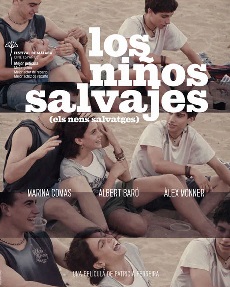 Tenemos la tendencia de separar nuestra experiencia de adolescente de la de adulto. Parece que nos olvidamos de que una vez sentimos rabia, angustia, desinterés, impotencia, y la necesidad de representar aquellos años. Quizás es un mecanismo de defensa para olvidar, pero seguramente todos hemos pasado por ello, incluso los que no nos rebelamos contra nosotros mismos.
Tenemos la tendencia de separar nuestra experiencia de adolescente de la de adulto. Parece que nos olvidamos de que una vez sentimos rabia, angustia, desinterés, impotencia, y la necesidad de representar aquellos años. Quizás es un mecanismo de defensa para olvidar, pero seguramente todos hemos pasado por ello, incluso los que no nos rebelamos contra nosotros mismos.
Patricia Ferreira, directora y guionista (con Virginia Yagüe) de esta película, cuenta una importante historia, que además nos recuerda aquel tiempo de la vida en el que solíamos hacer cosas cuando nadie nos veía, o teníamos pensamientos que guardábamos para nosotros mismos. Alex, Gabi y Oki van al mismo instituto. No parecen tener mucho en común, sino la curiosidad que sienten los unos por los otros. Después de un acontecimiento que los tres vivieron con intensidad, empiezan a pasar tiempo juntos. Comparten bebidas, risas, secretos, sueños, etc.
Con una estructura de película de suspense, Los niños salvajes, empieza como una historia sobre estos escandalosos e irresponsables chicos con mal comportamiento, para ir dando lugar a un inquietante relato sobre cómo las oportunidades que da la vida, el rol de los padres y el sistema educativo conforman los caracteres de los jóvenes durante sus años formativos.
La honestidad y el compromiso que vemos en esta película son el eco del recorrido periodístico de Ferreira, que bebe de otras obras que presentan a adolescentes problemáticos como protagonistas, como Los juncos salvajes, La clase, Déjame entrar, Felices dieciséis, o Parque paranoico.
El reparto comprende un talentoso trío de jóvenes en los papeles principales: Marina Comas, Àlex Monner, y Albert Baró. También incluye una espectacular interpretación de Aina Clotet, como consejera comprometida con la escuela, o Ana Fernández, que realiza el papel de madre preocupada. El papel de Fernández golpea a los espectadores con una de las declaraciones más duras sobre estos salvajes: “Un día llegaré a casa y mi hijo se habrá ido. Y lo habré perdido, pero entonces el problema no será solo mío sino vuestro también” (de nosotros como sociedad).
La película de Ferreira tiene muchas capas, pero es el espectador el que decide realizar una lectura superficial o llegar a un nivel más profundo. Los niños salvajes, fue grabada entre Barcelona y Sevilla, y ha sido galardonada como mejor película en el Festival de Cine de Málaga. Ha sido seleccionada también en numerosas categorías en el Festival Internacional de Cine de San Sebastián y a los Premios Goya. Su proyección estará acompañada de nuestro habitual debate en el CineCafé Club.
Texto: Miriam Abuin
Traducción al español: Esther Adorna Abril
Información adicional: Miriam Abuin (prendub@cervantes.es)
We have a tendency to put distance between our experience as teenagers and adulthood. We seem to forget we once felt rage, angst, boredom, powerlessness and the dependency that depicts those years. Perhaps it is a defense mechanism to forget, but it is almost cer
tain we all have been through that, even the non-rebellious among us. Patricia Ferreira, director and writer (with Virginia Yagüe) o
f this film, tells a story that matters, but also reminds us of that time in life in which we did things when nobody was watching, or had thoughts we only confided to ourselves.
Alex, Gabi and Oki go to the same high school, they don´t seem to have much in common but the curiosity they feel for one another. After an event the three of them live with intensity, they start to hang out together. They share drinks, laughs, secrets, dreams…
With a thriller structure, Los niños salvajes begins as a story about these noisy, irresponsible and misbehaved kids, to unfold into an unsettling tale about life choices, about the role of parents and the education system in shaping the youngsters characters during their formative years.
The honesty and commitment we see in this film is an echo of Ferreira´s journalistic background, who looks up at other titles with troubled teenagers as protagonists such as Wild Reeds, The Class, Let the Right One In, Sweet Sixteen or Paranoid Park.
The cast comprises a naturally gifted trio of young actors in the main roles: Marina Comas, Àlex Monner and Albert Baró. It also includes some outstanding supporting performances by Aina Clotet, as a committed school counsellor; or by Ana Fernández, who plays her part as a concerned mother. Fernández’s character hits the viewers with one of the bluntest statements about these wild ones: “One day I´ll get home and my son will be gone. And I would have lost him, but then the problem won´t be only mine, it will be yours too” (ours as a society).
Ferreira’s movie has many layers, but it’s the spectator’s choice to read at the surface or at a deeper level. The Wild Ones was filmed between Barcelona and Seville and has been awarded as best film at the Malaga Film Festival. It has also been nominated in several categories in the San Sebastian International Film Festival and the Goya Awards. The screening will be followed by the accustomed discussion at the CineCafé Club.
Press release: Miriam Abuin
Translation into Spanish: Esther Adorna Abril
For more information please contact: Miriam Abuin (prendub@cervantes.es)
Virtual interview with Jesús Ruiz Mantilla
Virtual interview with Jesús Ruiz Mantilla, Instituto Cervantes Dublin Library, 9th November 2011
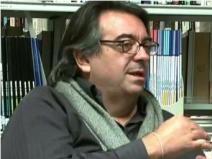
David Carrión
Good afternoon Jesús. In January you published the article “Why do I read?”, about the motivations of different writers. Why does Jesús Ruiz Mantilla write?
Jesús Ruiz Mantilla
In general I write for curiosity’s sake, to discover things and to discover myself. Also for love, for hate, to put order to chaos or to create chaos.
I write for people to read it, to share, to define and redefine and to try to understand. I write just like that, to get into the people, into people’s minds which I don’t get to understand, in order to understand them. I write to ask, to find out, to become a better person, to understand why I can get worse. To put forward paradoxes and contradictions but with the aim to share them, rather than resolving them.
DCarrion
Why do you read? Which were your first readings and who did you get them from?
Jesús Ruiz Mantilla
I got my first readings from my dad. He offered me a collection with books by Jules Verne, and he talked to me about the Odyssey and Iliad, but especially about Michel Strogoff, The Courier of the Czar and Captain Nemo. Then it comes all the rest. I read for the same reasons I write, also to copy and to get inspired, I read to recharge my batteries, to understand and to question.
Lola Rodríguez
What’s the most difficult thing about a writer’s profession? And about a journalist’s profession?
Jesús Ruiz Mantilla
The most difficult thing in a writer’s profession is to define the idea, to be able to capture on paper what you have in your mind. Regarding a journalist, it’s trying not to repeat yourself, to communicate clearly, to catch the readers’ attention everyday, the headline and the first paragraph.
LRodríguez
Journalism in Western countries if free to a certain extent. Is it the same with literature?
Jesús Ruiz Mantilla
Literature is absolutely free. Journalism is not, it’s only free.
LRodríguez
The five novels you have written look apparently quite different. What do they have in common? Maybe the idea of identity?
Jesús Ruiz Mantilla
The concept of identity is indeed obsessive in me. All my books deal with the personal identity and my new novel Ahogada en llamas, to be published next March, also tackles the concept of collective identity.
Other common features are the expression of sensations –for example, music in Preludio and Farinelli, taste, touch and smell in Gordo and Placer contra placer-, love, duality, paradox, memory, death…
DCarrión
Please talk about your first novel Los ojos no ven. Was Dali actually a fraud or this is just Pascual Burgaleta’s opinion?
Jesús Ruiz Mantilla
Los ojos no ven was just an exercise to prove myself that I was able to write a 200 pages novel.
On whether Dali was an impostor, I think his mistake was that he tried to convince us that he was a genius where he actually wasn’t, in painting. And however, he was a genius and a visionary where he thought he wasn’t: in filmmaking, in literature –his books are absolutely brilliant- and in making up a character, a feature of the post modernity which Dali explored before Warhol.
DCarrión
Please talk now about your second novel, Preludio. You are a music lover. Is Chopin your favorite musician?
Jesús Ruiz Mantilla
You’re right, I am a music lover, especially piano. The idea of this novel was to make up a pianist. For me pianists represent the paradigm of duality: with each hand they play a different thing at the same time. It’s as if they have two heads, that’s why I created a dual, bisexual León de Vega, with right and left ideals, tender and awful, tormented and attracted by the abyss, the excess and the romanticism.
I created a link with Chopin’s 24 Preludes because I wanted a musical structure, so I related his life in 24 chapters written at the rhythm of each prelude.
DCarrión
How much of José Francisco Alonso is there in the main character of this novel, León de Vega, a man obsessed with the Polish composer?
Jesús Ruiz Mantilla
José Francisco was my uncle. I liked to see him playing piano when he came to his home city from Viena, where he lived. I was fascinated by him and León de Vega has much of my uncle in him. He served as inspiration and example.
LRodríguez
You have said that your novel Gordo originates from an anger for the marginalization of fat people in Spain. What are your demands in this novel?
Jesús Ruiz Mantilla
It’s not exactly a vindication although it is a good excuse. But it surely comes from an anger, with the aim to defend what it’s different, the extreme versus the standard, the pleasure and the suffering, and a view to the grotesque.
LRodríguez
Fat people are a referent in comedy. If we assume that we like to make fun of the extremes, skinny people should make the same effect. However, it’s not. Why do you think skinny people are not that funny?
Jesús Ruiz Mantilla
I really don’t know. I rather feel pity for skinny people, poor them.
DCarrión
What do you mean when you say that García Márquez and Vargas Llosa are tremendously fat men “specially with regard to their erotic literature”?
Jesús Ruiz Mantilla
I mean that their writing style is sensual, exorbitant, baroque, full of calories, overwhelming. It gets you dizzy in a good way. They maximize the resources of the language, the imagination and the exuberance.
LRodríguez
Can you recommend a good novel in which cuisine and the pleasure of food is a core topic?
Jesús Ruiz Mantilla
From the Ancient Greek to present food has been widely depicted in literature. Don Quixote, for example, is a big gastronomy manual book, also a hunger manual though.
DCarrión
I was surprised that you said that Farinelli himself would have chosen to be castrated, that castrati felt as a special class. What did you see in Farinelli that made you write your fourth novel about him?
Jesús Ruiz Mantilla
I was attracted by the fact that he was a great postmodernist. We live in a baroque world where identities are confused and the castrati are exactly a paradigm of this. I also wanted to enhance Farinelli’s connection with Spain. He lived in Madrid for 20 years, he introduced Italian opera and he doesn’t even have a street with his name on it or a statute, it’s a disgrace.
DCarrión
With all my respects, would you have chosen to be fat? Is being fat a life philosophy?
Jesús Ruiz Mantilla
Nowadays that is something you can choose. Otherwise it gradually shapes your thinking, your feelings and your personality for better or worse. In my case, as Falstaff, my belly is my kingdom except that, contrary to Falstaff when he says ‘I’ll make it bigger’, I go to gym to reduce it.
LRodríguez
In Placer contra placer you examine the search for happiness through pleasure and the price that must be paid to reach it. If you had to give up all pleasures except for one, which one would you choose?
Jesús Ruiz Mantilla
Hard to say… Probably affection, love, company.
DCarrión
I am surprised that in the list of pleasures of your book sex is not included. Is it because it is a sin?
Jesús Ruiz Mantilla
There is a kind of obsession for sex in all my books, even when the characters cannot have sex, like Farinelli. I don’t know why I didn’t include it in Placer contra placer, but many people have noticed that. I’m pleased to refer you to my other books, where all my characters have an unrestrained sexuality.
LRodríguez
How is the search for happiness in the affluent society and how can be explained that 50% of Spanish population suffer from depression and anxiety? We don’t have enough with the little pleasures anymore?
Jesús Ruiz Mantilla
This is the reason why I wrote this book, in order to give my view on how to find the little pleasures. We are surrounded by depression and anxiety, and by pleasures too, but I don’t know why these go unnoticed, we let them go.
That is why I wanted to make people stop and think about the little pleasures we can enjoy in our daily life, be able to identify them, become aware of them, fix them in our mind and keep on going until we encounter the next one.
LRodríguez
In Placer contra placer you analyze the theories of the greatest philosophers in history to find the key to happiness. Which theory do you prefer?
Jesús Ruiz Mantilla
The Greeks’ one, particularly Epicure’s, who advocated that pleasure is a social enhancement tool.
Dcarrión
I have heard that your fifth novel, Ahogada en llamas, should have been released in autumn 2011. It’s being hard to finish it? When would it be available in the bookstores?
Jesús Ruiz Mantilla
It will be released in March next year.
LRodríguez
Can you recommend any (pleasant) remedy against the collective anxiety of Spainish population today?
Jesús Ruiz Mantilla
To think positive. To think that Spain has got back on it’s feet after harder times than today. In fact the book I am working on now tackles this subject. It’s about a girl who became homeless during the Spanish civil war but she managed to succeed, with faith, work and determination. The power of will overcomes everything.
Thank you very much for your participation.
Related links:
- Interview by Raúl González Rumayor on La revista de Caja Cantabria
- Interview to Mr. Ruiz Montilla on the publication of his book Gordo on Clublectura.com
- Article of Jesús Ruiz Mantilla on El País: “Por qué escribo”
- Podcast. Jesús Ruiz Mantilla talks about his book Gordo on the RNE radio programme La estación azul: listen audio
- Placer contra placer download the first chapter of the book
- Review of Placer contra placer
